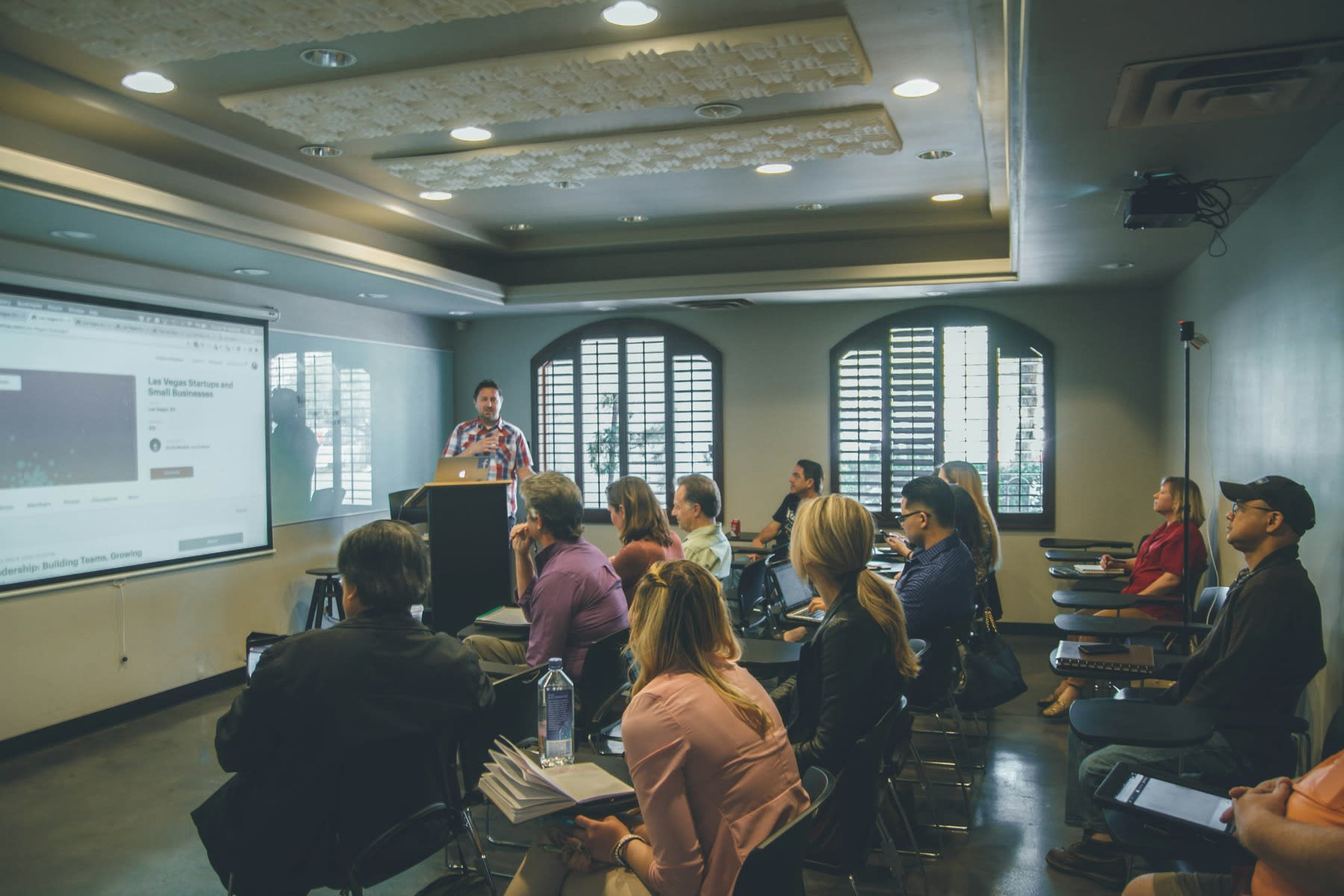What Can You Do with a Master’s in Adult Education?

Key Takeaways
- Those with a master’s in adult education can work as learning directors, educational consultants, policy analysts, or consultants.
- Graduates with a master’s in adult education apply specialized teaching strategies tailored for adults.
- Educators develop training programs, facilitate training, apply adult learning theories, and provide consulting services.
Getting a master’s in adult education comes with a rewarding range of job opportunities with high salaries. From being a corporate trainer manager to an educational consultant - with insights from our team of academics and data scientists, in this article, you’ll discover the career possibilities with a master’s degree in adult education.

Featured Programs
What can you do with a master’s in adult education?
Adult education master’s degree graduates can pursue roles such as corporate trainer managers, where they develop and deliver training programs. Principals and instructional designers can create curricula and instructional materials tailored for adult learners. Positions like learning directors, educational consultants, and policy analysts shape policies, provide consulting services, and oversee program implementation.
With your master’s in adult education, you are well-equipped to empower adults through learning and professional development. By embracing the versatility of this degree, graduates can actively contribute to lifelong learning, skill development, and the advancement of adult education (AE) practices.
Teach Skills to Adult Learners
Earning a master’s in adult education empowers you to help adult learners develop valuable skills and knowledge.
Data from the Program for the International Assessment of Adult Competencies reveals that about 43 million American adults have low literacy skills. As an educator, you will apply specialized teaching strategies tailored for adults who bring their life experiences into the learning environment.
Develop Training Programs and Facilitate Training
You’ll be able to craft educational programs that cater to adults looking to advance in their careers or switch professional paths. Use your expertise to guide adult students through their educational journey, making sure the material is accessible and engaging.
This may involve interactive workshops where you can create sessions that encourage active participation and practical application of concepts. Another option is to develop customized learning materials or curricula that reflect the diverse backgrounds and needs of learners.
Apply Adult Learning Theories
By understanding adult learning theories, you’ll be more effective in your role. These theories provide insights into how adults learn best, often emphasizing the importance of self-direction and practical application.
Your role as a facilitator will aid in their professional development while also supporting their confidence as lifelong learners. You’ll find your work incredibly rewarding as you observe your learners successfully apply the skills taught to enhance their lives and careers.
Develop Programs and Training Instructions
Your newly gained skills allow you to develop comprehensive training programs that cater to the professional and personal development needs of adults. Whether in corporate settings, higher education, or community organizations, you may facilitate learning that can lead to career advancement or personal enrichment.
Here’s how you can apply your abilities:
- Identify learning objectives to know what your learners need to achieve.
- Develop curriculum and design courses that are practical and relevant to AE.
- Design instruction programs and use adult learning theories to create engaging content.
- Evaluate learning outcomes and assess the effectiveness of your programs.
Tailor Instruction to Adult Learners
Adult education serves as a gateway to further learning opportunities. A study reveals that 93% of participants believe AE courses increased their motivation to continue their education. This shows that successful engagement in adult learning programs equips learners with practical skills while also fostering personal growth, self-confidence, and a newfound enthusiasm for lifelong learning.
By focusing on enriching the lives of adult learners through education, you can teach skills while empowering individuals to achieve their goals and contribute meaningfully to their communities.
- Understanding adult learners are often self-directed and value learning that is immediately relevant to their personal or work lives.
- Incorporate flexibility in course design to accommodate the varied schedules of adult learners.
- Leverage technology to enhance learning, recognizing that adults may prefer online learning environments for their convenience and flexibility.

Provide Consulting Services
Providing consultancy services is one of the vocational avenues for a master’s degree in adult education. This unique skill set allows you to provide advice and strategies to various organizations on how to educate and train adults effectively.
- Non-profit organizations: You can help these entities develop educational programs tailored to diverse adult audiences, taking into account the unique challenges and motivations that adult learners face.
- Government: Guide government agencies in creating accessible education initiatives or workforce development programs aimed at improving skills.
Impart Knowledge in Various Areas
Your role as a consultant can be transformative, empowering organizations to enhance their educational offerings and contribute to lifelong learning. Your efforts will impact the immediate learning environment, promoting personal growth and professional development across communities.
- Curriculum development to craft engaging learning modules that resonate with adult learners.
- Training strategies to implement innovative methodologies for AE and professional development.
- Learning assessments and design evaluation tools to measure program effectiveness and learner outcomes.
- Program management to provide advice on how to structure adult learning programs to maximize reach and impact.
Supervise Policies
Pursuing a master’s degree in adult education can equip individuals with the knowledge and skills necessary for effective policy supervision in various sectors. This advanced degree program explores theories and practices related to adult learning, instructional design, and program evaluation. These are invaluable assets for overseeing the implementation and assessment of policies.
Additionally, it fosters critical thinking, research capabilities, and leadership skills. These enable graduates to contribute to evidence-based policymaking and guarantee compliance within organizational contexts.
- Develop a comprehensive understanding of adult learning principles and theories
- Enable effective communication and training strategies for policy implementation.
- Gain expertise in program evaluation and assessment methods.
- Monitor policy adherence and measure the impact of policy initiatives.
- Enhance research and analytical skills.
- Facilitate data-driven decision-making and evidence-based policy recommendations.
- Cultivate leadership and management abilities.
- Oversee policy implementation teams, coordinate resources, and promote accountability.
Oversee Adult Education Programs and Budgets
With a master’s in adult education, you can manage and improve various aspects of adult learning initiatives. In overseeing programs, you will make sure that the curriculum meets the needs of adult learners, which often include flexible scheduling and practical, real-life applicability.
Manage Programs
By following our recommendations for higher education, we’ve encountered professionals who gained the ability to interpret and implement policies, influencing a successful way of delivering adult education. With your degree, you can manage policies that require staying abreast of changes in educational regulations and integrating them skillfully into your program’s framework.
- Assess community needs and tailor education to address the unique demands of your community.
- Develop curriculum and regularly update course content for relevancy and impact.
- Maintain educational quality and high standards in instructional methods and material.
Distribute Resources and Budgets
The federal government provides $675 million in state funding for AE. However, this figure has been stagnant for more than 20 years. The lower funding results in smaller programs, with less than 3% of eligible adults receiving services.
With profound knowledge and expertise gained from a graduate degree in adult education, your role involves facilitating the continuous education of adult learners. In effect, you can help them grow professionally and personally through the efficient use of funds to support educational goals. It also involves distributing resources strategically to areas of greatest need.
Conduct Research
One of the common reasons why professionals reach out to us for guidance in higher education is because of their goal of entering the field of research. With a master’s degree in adult education, you’ll have the opportunity to engage deeply in research activities.
These activities are valuable for developing better educational strategies, understanding adult learning patterns, and influencing policy.
- Start with identifying critical issues in AE that align with your interests.
- Formulate clear and concise research questions that aim to address gaps in the field.
- Choose appropriate research methods, whether qualitative, quantitative, or a mixed-methods approach.
- Gather and analyze data employing rigorous, ethical practices to guarantee the validity and reliability of your findings.

Use Research to Contribute to Strategies and Policies
Your research can influence practical applications in AE, from classroom instruction techniques to administrative policies. Your findings could also contribute to the evidence base that supports effective strategies, thereby impacting learners, educators, and policymakers.
- Navigate through complex theoretical frameworks to guide your study.
- Connect with a diverse adult learner population to gain a broad perspective.
- Contribute to the field by publishing your findings in academic journals or presenting at conferences.
Build Networks and Continue Learning Opportunities
Earning a master’s in adult education opens doors to continuing education and the ability to build influential networks. With your advanced degree, you’re poised to engage with a community of professionals committed to lifelong learning. Here are ways you can expand your horizons:
- Professional development by attending industry conferences, workshops, and seminars to stay current with educational trends.
- Communities of practice by joining or initiating study groups and professional circles within your field.
- Connect with experts by seeking mentorship opportunities and engaging with thought leaders.
Engage With Different Sectors
As we guide professionals in achieving their adult education master’s degree, these are the sectors where we encourage students to collaborate with diverse organizations.
- Colleges and universities: Contribute to academic research and development.
- Community organizations: Design and facilitate programs tailored to community needs.
- Corporations: Partner with businesses to develop their workforce training programs.
- Online platforms: Share research, discover projects, and network with like-minded individuals.
What Are The Employment Opportunities for an Adult Education Master’s Degree?
While evaluating potential jobs for adult education master’s degree graduates, we’ve also explored the broad spectrum of areas where you can make significant contributions. Whether you’re interested in corporate settings, academic institutions, or independent consulting, your specialized knowledge is valuable in multiple arenas.
| Job Position | Job Outlook (2022 to 2032) | Annual Median Salary |
|---|---|---|
| Corporate training manager | 6% | $125,040 |
| Learning and development director | 4% | $119,995 |
| Principal | 1% | $103,460 |
| Policy analyst | 8% | $86,784 |
| Instructional designer | 2% | $74,620 |
| Literacy specialist | 4% | $65,000 |
| Educational consultant | 10% | $63,212 |
| Adult basic or secondary education and ESL teacher | -13% | $60,560 |
Corporate Trainer Manager
As a corporate trainer manager, you’ll oversee the development and implementation of training programs within organizations. Your role will involve designing training curricula tailored to company needs. You’ll also need to manage the training team to guarantee effective adult learning.
Learning and Development Director
Do you want to formulate strategic organizational learning policies? As a learning and development director with an adult education master’s degree, you can lead initiatives to enhance employee skills and knowledge.

Principal
Working as a principal at an AE center, you hold a pivotal leadership position, responsible for setting educational standards and goals. Your role also covers evaluating and improving teaching methods.
Policy Analyst
As an AE policy analyst, you will evaluate the impact of educational policies. With experience and training, you can advocate for changes to improve adult learning experiences.
Instructional Designer
As an instructional designer, your expertise will help you develop engaging courses that cater to adult learners. Your graduate degree training also lets you use the latest technology to create accessible educational content.
Literacy Specialist
Literacy specialists contribute to AE by working directly with learners to improve their literacy skills. This is a good job to explore when you’re interested in assessing and addressing individual learning challenges in various school setups.
Educational Consultant
Your mastery in adult education will be pivotal as an educational consultant, as you provide expert advice to top educational institutions and businesses. This is the ideal job for professionals aiming to tailor educational programs to learner demographics.
Adult Basic or Secondary Education and ESL Teacher
The degree provides a deep understanding of adult learning principles, allowing you to create effective lesson plans and instructional materials that cater to the unique needs and backgrounds of adult students. The research and analytical skills you’ll acquire will enable you to assess and address the diverse literacy and language needs of your adult learners.
Related Questions
How to Choose Programs and Institutions for a Master’s in Adult Education?
When selecting the right programs and institutions for your master’s in adult education, it’s important to look into accreditation, curriculum, and the resources available to students. You also need to consider the faculty qualifications, financial aid, and education modalities, whether it’s on-campus, online, or hybrid.
What Is the Program Structure of a Graduate Degree in Adult Education?
The program structure for an adult education graduate degree typically includes core and elective coursework, a practicum or internship, and a culminating project or thesis. Some programs allow you to pace your education and may accommodate your schedule whether you opt for full-time or part-time study.
What Are the Admission Requirements and Application Process for a Master’s Degree in Adult Education?
Admission requirements for a master’s degree in adult education usually encompass a completed bachelor’s degree in education, relevant work experience, letters of recommendation, a personal statement, and sometimes, GRE scores. Understand each program’s specific requirements to prepare your application well in advance of deadlines.
Conclusion
After exploring the range of careers accessible with a master’s in adult education, you can confidently chart your professional journey. Whether it’s designing instructional materials, training corporate employees, coordinating community programs, or conducting research, understanding the possibilities empowers informed decision-making and doing fulfilling and impactful work.